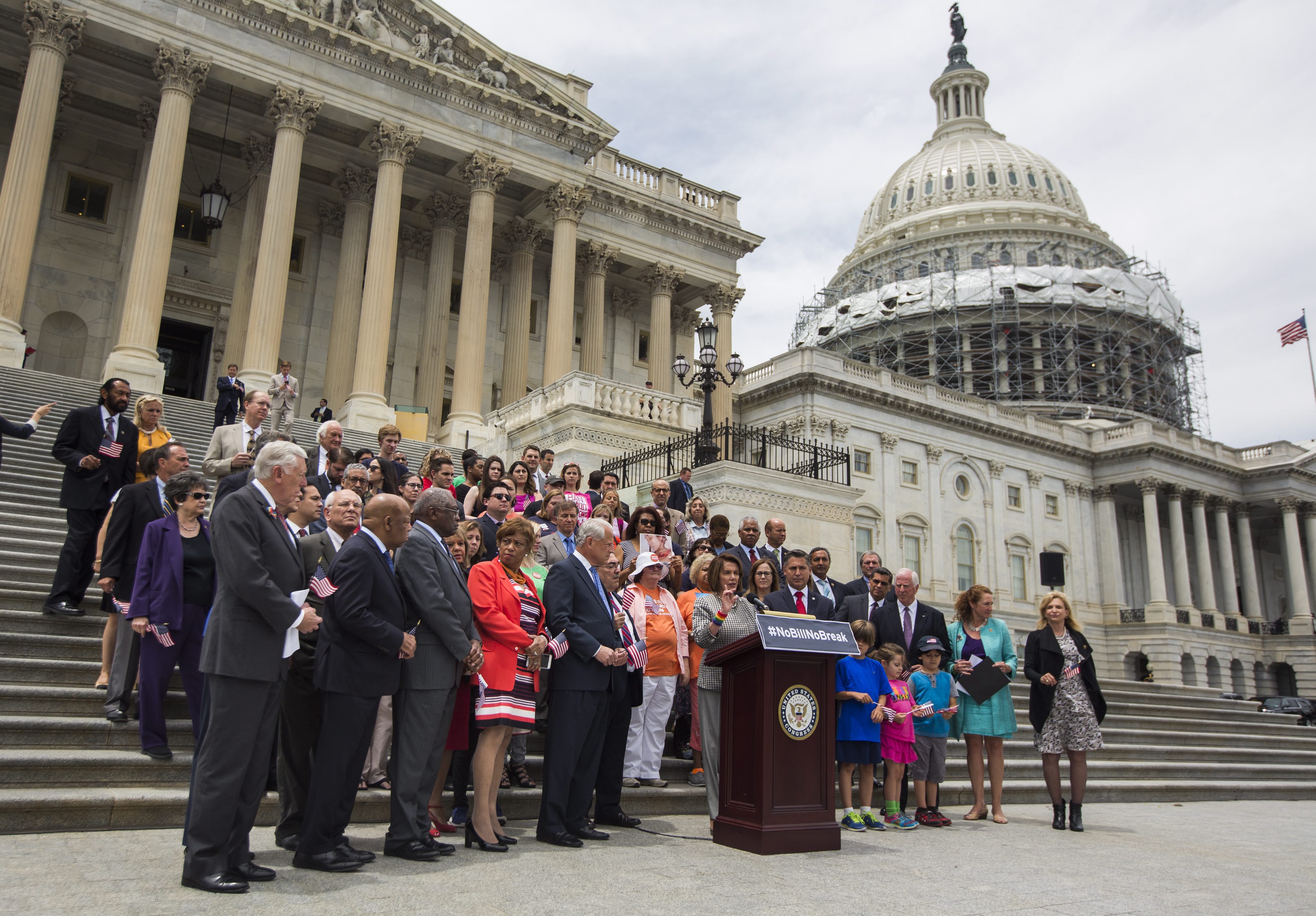In the wake of the June 12 Orlando nightclub massacre, Congress has found itself gridlocked over what to about guns — or whether to do anything at all.
This has been the pattern in recent memory: a tragedy; a heartfelt speech; a call for action; and a stalemate. But since 1990, Congress has actually legislated on guns repeatedly, sometimes tightening and sometimes loosening regulations. Here's a timeline of key moments in 26 years of gun debate.
Nov. 29, 1990
President George H. W. Bush signs the Gun-Free School Zone Act of 1990, which prohibits firearms in school zones.
Oct. 16, 1991
George Hennard, 35, crashes his pickup truck into a Luby’s cafeteria in Killeen, Texas and guns down 22 people.
Nov. 30, 1993
President Bill Clinton signs the Brady Handgun Violence Prevention Act of 1993, requiring gun buyers get background checks when purchasing guns from federally licensed dealers and implementing a five-day waiting period.
Sept. 13, 1994
Clinton signs the Violent Crime Control and Law Enforcement Act of 1994, prohibiting the manufacture or importation of semiautomatic assault weapons and increasing penalties for criminal use of firearms.
April 26, 1995
The U.S. Supreme Court decides the Gun-Free School Zone Act is unconstitutional during the United States v. Lopez case.
Sept. 30, 1996
Congress enacts the Domestic Violence Offender Gun Ban, which prohibits persons convicted of misdeameanor domestic violence crimes or under restraining orders from possessing, using or transporting guns.
Oct. 21, 1998
Clinton signs The Omnibus Consolidated and Emergency Supplemented Act of of 1999, which requires federal firearm licensees to sell gun storage and safety devices.
April 20, 1999
Columbine High School students Eric Harris,18, and Dylan Klebold, 17, open fire at school, killing 13 people and injuring 21 more in Littleton, Colo.
![AP A06 4ROUNDUP 22 A USA CO [image : 86263686]](http://www.gannett-cdn.com/media/2016/06/22/USATODAY/USATODAY/636022140167105836-AP-A06-4ROUNDUP-22.jpg)
Nov. 25, 2002
President George W. Bush signs the Homeland Security Act of 2002, establishing the Bureau of Alcohol, Tobacco, Firearms and Explosives.
Sept. 13, 2004
The Violent Crime Control and Law Enforcement Act assault-weapon ban expires after 10 years.
March 21, 2005
Jeffrey Weise, 16, kills seven people and injures five more at a shooting in Red Lake High School in Red Lakes, Minn. He also killed his grandfather and his grandfather's girlfriend before heading to the school.
Oct. 26, 2005
Bush signs the Protection of Lawful Commerce in Arms Act, stopping certain litigants from recovering damages against firearm dealers and manufacturers when guns are unlawfully used.
April 16, 2007
Seung Hui Cho, 23, goes on a shooting spree at Virginia Tech in Blacksburg, Va., killing 32 people.
![AP VIRGINIA TECH SHOOTING A SOU USA VA [image : 86263864]](http://www.gannett-cdn.com/media/2016/06/22/USATODAY/USATODAY/636022141932569153-15345271.jpg)
Jan. 8, 2008
Bush signs the NICS Improvement Amendments Act of 2007, which improves federal and state electronic recordkeeping for use in background checks on people ineligible to possess firearms due to mental illness or domestic violence.
Nov. 5, 2009
U.S. Army Maj. Nidal Hasan, 45, fatally shoots 13 people and injures 30 others at Fort Hood near Killeen, Texas.
Jan. 8, 2011
Jared Lee Loughner, 27, opens fire at a constituent event for Rep. Gabrielle Giffords in a Casas Adobes, Ariz. supermarket parking lot, killing six people and critically injuring Giffords.
![AP CONGRESSWOMAN SHOT A USA AZ [image : 86263954]](http://www.gannett-cdn.com/media/2016/06/22/USATODAY/USATODAY/636022142959991739-AP-Congresswoman-Shot.jpg)
July 20, 2012
James Holmes, 28, shoots and kills 12 people in an Aurora, Colo., movie theater.
Dec. 14, 2012
Adam Lanza, 20, guns down 20 children and six adults at Sandy Hook Elementary School in Newtown, Conn.
April 18, 2013
Senate rejects Nevada Democratic Sen. Harry Reid's Safe Schools Act of 2013, which would have required background checks for every firearm sale.
![AP CONGRESS GUN CONTROL A USA DC [image : 86264154]](http://www.gannett-cdn.com/media/2016/06/22/USATODAY/USATODAY/636022145309678801-AP-Congress-Gun-Control.jpg)
Sept. 16, 2013
Gunman Aaron Alexis, 34, fatally shoots 12 people and injures three others at the Naval Sea Systems Command headquarters at the Washington Navy Yard in D.C.
June 17, 2015
Dylan Roof, 22, opens fire at a weekly Bible study at the Emanuel African Methodist Episcopal Church in Charleston, S.C., killing nine people.
Oct. 1, 2015
Christopher Harper-Mercer, 26, shoots and kills an assistant professor and eight students in a classroom at Umpqua Community College near Roseburg, Ore.
Dec. 2, 2015
Syed Farook, 28, and Tashfeen Malik, 29, open fire at a San Bernardino County Department of Public Health holiday party, killing 14 people and injuring 22 others in San Bernardino, Calif.
Dec. 3, 2015
Senate rejects measures to expand background checks for guns purchased online and at gun shows and an amendment to prevent individuals on the terror watch list from purchasing firearms.
Jan. 5, 2016
President Obama issues executive actions that include hiring more people to run the FBI background check system and asks Congress for $500 million to increase access to mental health care.
June 12, 2016
Omar Mateen, 29, opens fire in a gay nightclub in Orlando, Fla., leaving 49 dead and 53 injured.
![XXX LAKE_EOLA_VIGIL_FOR_PULSE_SHOOTING_VICTIMS_CR_93551.JPG FL [image : 86264800]](http://www.gannett-cdn.com/media/2016/06/22/USATODAY/USATODAY/636022153923118015-XXX-LAKE-EOLA-VIGIL-FOR-PULSE-SHOOTING-VICTIMS-CR-93551.jpg)
June 20, 2016
Senate rejects four gun measures to expand background checks and ban gun sales to people on the terror watch list.
June 22, 2016
House Democrats stage a day-long sit-in on the chamber floor, demanding a vote on gun control measures. House Republicans refuse the demand, calling the sit-in a "publicity stunt."
Contributing: Donovan Slack

![Paul Ryan vows to Vote on gun control legislation next week [video : 86584052]](http://videos.usatoday.net/Brightcove2/29906170001/2016/07/29906170001_5015099542001_5015029450001-vs.jpg?pubId=29906170001)

![XXX AP_931130081_DCB.JPG A USA DI [image : 86264520]](http://www.gannett-cdn.com/media/2016/06/22/USATODAY/USATODAY/636022149187551659-XXX-AP-931130081-dcb.JPG)
![XXX SAL_UCCSHOOTING_AR_23.JPG USA OR [image : 86264356]](http://www.gannett-cdn.com/media/2016/06/22/USATODAY/USATODAY/636022146793092310-XXX-SAL-UCCShooting-ar-23.JPG)
